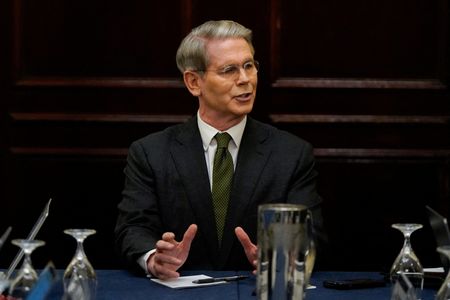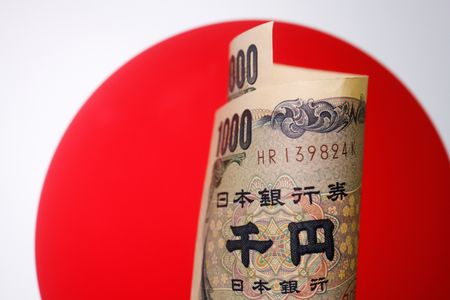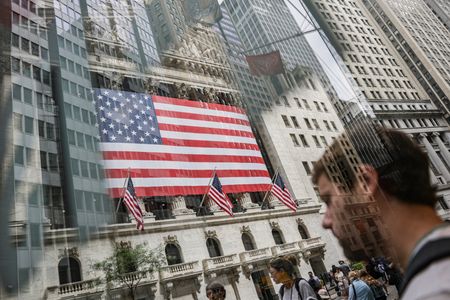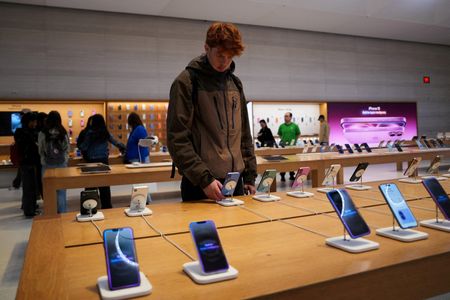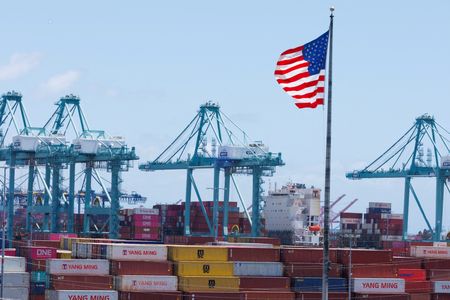By David Lawder
WASHINGTON (Reuters) -U.S. Treasury Secretary Scott Bessent said on Wednesday that he believes that excessively high tariffs between the U.S. and China will have to come down before trade negotiations can proceed but said President Donald Trump would not unilaterally cut tariffs on Chinese imports.
Bessent told reporters on the sidelines of International Monetary Fund and World Bank annual meetings that de-escalation was necessary for the world’s two largest economies to rebalance their trading relationship.
Asked whether that meant a reduction in the 145% U.S. tariffs on Chinese goods and China’s 125% tariffs on U.S. goods, Bessent said: “I think that has to be, because again, neither side believes that these are sustainable levels. As I said yesterday, this is the equivalent of an embargo and a break between the two countries in trade does not suit anyone’s interest.”
Bessent said there were no plans for Trump to move first in lowering tariffs to de-escalate a bitter U.S.-China trade war, echoing comments from White House spokesperson Karoline Leavitt that there would be “no unilateral reduction in tariffs against China.”
“I would not be surprised if they went down in a mutual way,” Bessent added.
Bessent said that the Trump administration was working to restore tariff certainty through negotiations with dozens of countries, and he did not think that it would involve an “extended process,” because countries will want to avoid the higher reciprocal tariffs that were announced on April 2.
Bessent also clarified previous remarks about a two- to three-year timeline for a U.S.-China deal, saying that this referred to the full rebalancing process, not the negotiations for a deal, which should happen much faster.
He said earlier that it was time for China to rebalance its economy toward consumption, and called for a joint rebalancing, with the U.S. shifting towards manufacturing.
He said the third quarter of this year is a “reasonable estimate” for achieving clarity on the ultimate level of Trump’s tariffs, and said he was not concerned about the IMF’s steep U.S. growth downgrade by nearly a full percentage point to 1.8% for 2025, a cut due largely to Trump’s tariffs, retaliation and the uncertainty that they are causing.
Bessent has set a goal for pushing U.S. growth and argued that Trump’s economic policies would propel growth up to 3% through more energy production.
“I’m not concerned about the IMF projections. And again, I think the third quarter would probably be a reasonable estimate that we will have clarity on tariffs,” Bessent said. “We will have the tax bill done, and I would think that the deregulation, as I mentioned, was always going to be the slowest component, but that should start kicking in in the third and fourth quarters.”
NEGOTIATIONS ELSEWHERE
Bessent said talks with other countries were continuing, and that a deal with India was “very close.” The talks with India were easier because the South Asian country’s trade barriers were mostly high tariffs, with “no currency manipulation” and fewer complex non-tariff trade barriers, he added.
India and China are among the roughly 15 largest U.S. trading relationships that the Trump administration is prioritizing for negotiations aimed at reducing the U.S. trade deficit.
“I don’t think that the economy will rise and fall off of the Bahamas and Costa Rica negotiations,” Bessent said.
Regarding talks with the EU, Bessent said that digital services taxes in countries such as France and Italy aimed at U.S. technology platforms were a problem that the Trump administration wants to incorporate into negotiations.
Talks with Japan would include multiple factors including “tariffs, non-tariff trade barriers, currency manipulation and government subsidy of labor and fixed capital investment,” Bessent said, but they would not include specific targets for the dollar-yen exchange rate.
(Reporting by David Lawder; Editing by Franklin Paul and Andrea Ricci)

